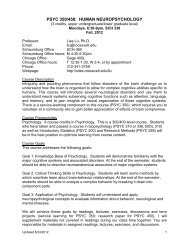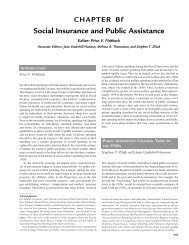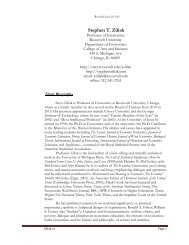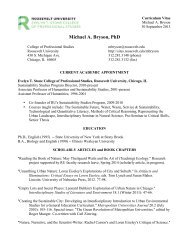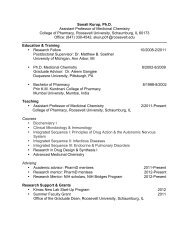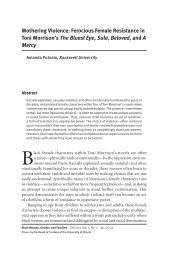Reading the Book of Nature
Reading the Book of Nature - Roosevelt University Sites
Reading the Book of Nature - Roosevelt University Sites
Create successful ePaper yourself
Turn your PDF publications into a flip-book with our unique Google optimized e-Paper software.
movements in <strong>the</strong> 1960s, Watts closely aligned herself with <strong>the</strong> sweeping transformations in <strong>the</strong><br />
nation's environmental attitudes and policies during that tumultuous time, as signaled by <strong>the</strong><br />
publication <strong>of</strong> Rachel Carson's Silent Spring in 1962, <strong>the</strong> first Earth Day in 1970, and <strong>the</strong> passage<br />
<strong>of</strong> landmark environmental legislation (such as <strong>the</strong> Clean Air and Water Acts) in <strong>the</strong> late 60s and<br />
early 70s. Watts thus is a critically important but hi<strong>the</strong>rto unrecognized voice in that<br />
transformative movement, and her life's work -- like that <strong>of</strong> Carson, ano<strong>the</strong>r pioneering female<br />
scientist-writer -- merits both wider recognition and critical scrutiny.<br />
A contemporary assessment <strong>of</strong> Watts' literary/artistic depictions <strong>of</strong> ecology and local<br />
landscapes forms a significant thread within Mapping <strong>the</strong> Urban Wilderness and thus greatly<br />
contributes to our understanding <strong>of</strong> urban ecology, especially that <strong>of</strong> Chicago. The Chicago<br />
region is home to eight million people, numerous endangered species and imperiled habitats <strong>of</strong><br />
both local and global significance, and dozens <strong>of</strong> environmental and scientific groups (from large<br />
institutions to small grass-roots organizations) dedicated to understanding and conserving <strong>the</strong><br />
local environment. My project is thus a part <strong>of</strong> <strong>the</strong> environmental education and advocacy work<br />
here in <strong>the</strong> Chicago area and, by extension, elsewhere -- efforts that include hands-on studies <strong>of</strong><br />
science and nature in K-12 grades, public outreach programs in wildlife and habitat conservation,<br />
research efforts to document <strong>the</strong> area's biological and ecological diversity, social activism<br />
focused upon achieving environmental justice for all citizens regardless <strong>of</strong> race or location, and<br />
literary/artistic representations <strong>of</strong> urban nature that foster a deeper awareness <strong>of</strong> our place with<br />
<strong>the</strong> natural environment.<br />
This research agenda also relates directly and positively to my teaching within and<br />
directorship <strong>of</strong> <strong>the</strong> Sustainability Studies Program here at Roosevelt, and consequently to <strong>the</strong><br />
university's mission-driven focus on local outreach to and understanding <strong>of</strong> <strong>the</strong> greater<br />
6



